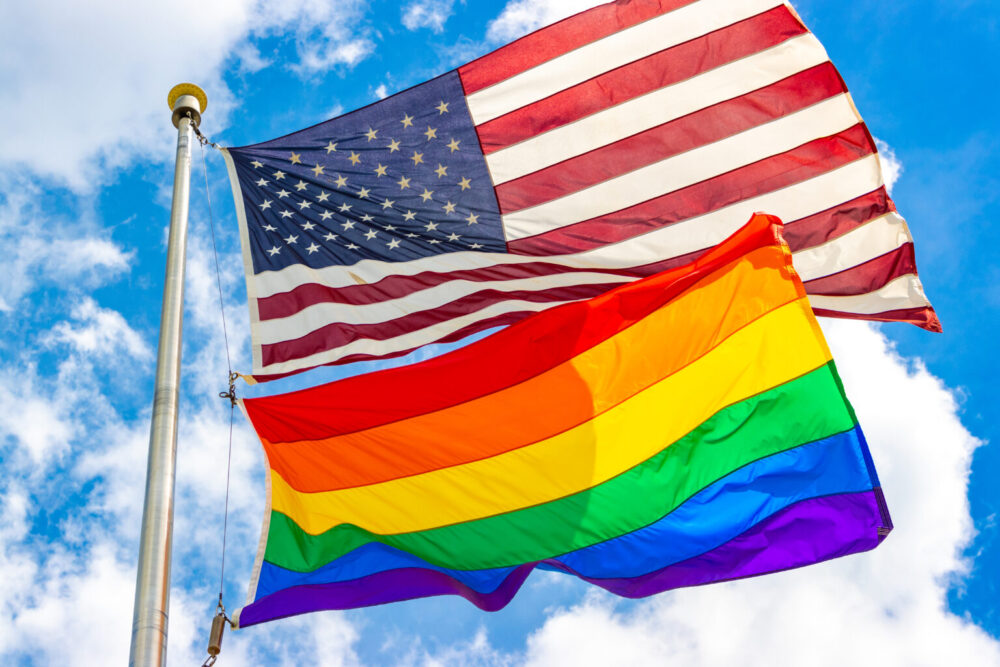A modern day version of ‘Pride and Prejudice’

contributed photo The rainbow flag of the gay pride movement and the flag of the United States.
Jane Austen’s “Pride and Prejudice” focused on manners and goodness, two virtues sometimes forgotten today.
Shortly before the novel was published, our Founding Fathers settled on the free exchange of ideas as one of the fundamental concepts they wanted to guarantee in the First Amendment to the U.S. Constitution.
But in 2025, there is an uncomfortable tug-of-war occurring over pride and prejudice, expression and oppression.
That tug-of-war was on display during the Ottumwa City Council meeting last week. A similar debate is happening elsewhere around Iowa and across the nation over a variety of civic issues where opinions vary widely.
The subject of the Ottumwa discourse was a proposed proclamation designating June as Pride Month there. The city made similar designations in each of the past five years with nary a peep of protest.
But a couple of residents objected to the new proclamation when it came to a vote last week. What ensued was a refreshing, and polite, discussion among those residents, Mayor Rick Johnson and members of the council.
No one called anyone a moron, lunatic, scum, loser, traitor or crook. Manners AND free expression prevailed.
The Ottumwa discussion comes at a time when American colleges and universities are not so lucky. Whether assailed by the federal or state governments, these schools face pressure, if not coercion, to abandon policies and programs that encourage consideration of a wider cross-section of students, job applicants and voices.
The discussion in Ottumwa came amid continuing controversy over rallies around the United States, where Israel’s treatment of law-abiding Palestinians in Gaza has been loudly criticized — with the Trump administration drawing no distinction between peaceful events and events advocating violence toward Israel and Jews.
The Ottumwa discussion also coincided with the decision by the American Civil Liberties Union of Iowa to send warning letters to five cities — Carroll, Harlan, Mount Pleasant, Polk City and Webster City. In those letters, the ACLU said the cities must change their ordinances classifying performances by “female impersonators” and “male impersonators” as prohibited forms of adults-only entertainment.
The ACLU said the ordinances are unconstitutional because they try to stop non-obscene forms of free expression that are protected by the First Amendment. That free expression is on display in popular movies like “Mrs. Doubtfire,” when female comedians with short hair perform while wearing a suit and tie, or when men wear gowns and wigs in a Pride parade.
“These outdated ordinances go far beyond prohibiting objectionable or obscene conduct,” ACLU attorney Shefali Aurora wrote in the letters. “To be clear, drag is not a synonym for obscenity.”
Back in Ottumwa, Councilman Bill Hoffman Jr. spoke eloquently about retaining the Pride Month proclamation. His reasoning provides important insight for other situations where some disagree with the message espoused by others.
“If you don’t like Pride Month, don’t celebrate it. If you don’t want to go to a Pride event, don’t go,” Hoffman said, the Ottumwa Courier reported.
“When I ran for council, I promised to protect 25,579 people and their legal rights, and to take a proclamation off that celebrates people, to me is absolutely appalling.”
Katie Howard, one of the opponents to the proclamation, urged the council to reject Pride Month. She said the council should follow the lead of the federal government’s efforts to end diversity, equity and inclusion practices.
“Being gay may not be a choice, but being trans is, and you’re celebrating everything,” Howard said. “I’d also like to point out that mental health is not a choice. Colon cancer is not a choice. Being black is not a choice. You’re equating apples and oranges.”
Councilman Dan Reid, the only person voting against the 2025 Pride proclamation, added: “It’s always my desire to try to treat everybody with respect, kindness and dignity. That’s just my policy. That’s why I felt like this proclamation is giving a specific select group of people a special month. It’s just more honor than average.”
Councilwoman Cara Galloway responded: “Trying to remove this one after years of support doesn’t really feel like a principled stand. It almost looks like discomfort with the LGBTQ+ community and inclusion. We can’t ignore that LGBTQ+ youth are among the most at risk for mental health and suicide.”
Mayor Johnson weighed in: “If we don’t continue to recognize and celebrate everybody that’s part of the community, we’re not living up to the goals and pillars” of the city’s mission.
Councilman Hoffman added, “We’re a diverse town and we should be proud of that. And anybody who stands at that podium should be celebrated. That’s what we want. Differences of opinion are what make the town great.”
Talk about sense and sensibility: The right to peacefully express one’s opinions, whether those are shared by many or by a few, regardless of how government officials stand on an issue, lies at the heart of what makes the United States a nation of rights and freedoms.
——-
Randy Evans is the executive director of the
Iowa Freedom of Information Council. He can be reached
at DMREvans2810@gmail.com.




